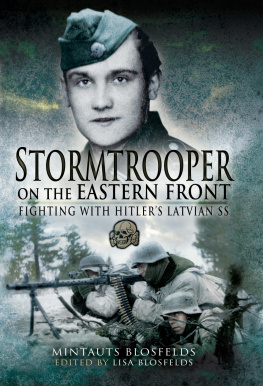THE LEGION OF THE
DAMNED
Sven Hassel
Translated from the
Danish by Maurice Michael
Copyright 1957 by Sven Hassel
Library of Congress catalog card number 57-8132
This book is dedicated to the unknown soldiers who fell for a cause that was
not theirs, my best companions in the 27th Armored (Penal) Regiment and the
brave women who helped me in those grim and dreadful years:
- Oberst Manfried Hinka
- Oberstleutnant Erich von Barring
- Oberfeldwebel Willie Beier
- Unteroffizier Hugo Stege
- Stabsgefreiter Gustav Eicken
- Obergefreiter Anton Steyer
- Gefreiter Hans Breuer
- Unteroffizier Bernhard Fleischmann
- Gefreiter Asmus Braun and
- Eva Schadows, Student of Law
- Ursula Schade, Doctor of Medicine
- Barbara von Harburg, Nurse
- Countess Mirza Testanowa-Golynska
- Erika Wolter, Actress
Publisher's Note
The American publisher is presenting this book as a documentary novel rather
than as an autobiography, primarily because this is Sven Hassel's wish. It was
originally presented in autobiographical form in Denmark. Though the story is,
in the author's words, "ninety per cent fact," he has taken a few of
its manifold episodes from the experiences of others.
Proofer's Note
The character known as "The Old Un" in this work is known as
"The Old Man" or "Willie Beier" in many of Sven Hassel's
other works. I believe that "Pluto" is the character known as
"Tiny" or "Little John". However, some aspects of this work
do not hold true with others. Julius Heide is not mentioned, nor is Barcelona,
or the Legionnare (well there is on passing reference, see if you can spot it).
Many later works take place during the later stages of this novel. A lot
of later novels do not appear to fit in with this work, for instance the lack
of "Oberstleutnant Erich von Barring"'s appearance in those works.
The original proofer's german sucked, so much has been corrected.
THE LEGION OF THE DAMNED
"Well, the five minutes are up. You must take the consequences!"
He pressed a bell. Two big SS men in black uniforms came in. A brief order--and they dragged Eva across to a table covered with leather.
Filthy Deserter
The previous day the big sapper had been before the courtmartial and received a sentence of eight years' hard labor. Now it was my turn. I was taken to the court, guarded by two "watchdogs." I was held in a large room, one wall of which was covered with a gigantic painting of Adolf Hitler, while Frederick the Great hung facing him. Behind the president's chair hung four huge flags--those of the air force, navy, army and SS. Along the wall were lined the standards of the different arms: white with a black cross for the infantry; red for the artillery; yellow for the cavalry; pink for the armored troops; black with silver trimmings for the engineers; the jaeger regiments' green with a hunting horn, and all the others. The judge's desk itself was covered with the black-white-red flag of the Wehrmacht.
The court consisted of a legal adviser with the rank of major; two judges--one a Hauptmann, the other a Feldwebel; and a prosecutor, an SS Sturmbannfuhrer.
A filthy deserter is not entitled to a defending counsel.
The charge was read out. I was examined. The judge ordered the witnesses to be produced. First came the Gestapo man who had arrested Eva and me when we were bathing out by the mouth of the Weser, and the summery sound of lazily lapping waves suddenly imposed itself upon the proceedings in court. The hot, shimmering white dune-sand... Eva standing there, drying her rounded thighs... her bathing cap... the heat on my back... the heat, heat.
"Yes, I jumped up onto the desk and from there out through a window."
In all, five different police officials had interrogated me, and they came now and gave their evidence. "Yes, I gave him a false name." "No, the explanation I gave him was not the truth."
It was queer seeing the kriminalsekretar, who had ordered Eva to be whipped. The others were sadists, but he was just correct. You cannot do anything with people who are correct. There are far too many of them. I began a lovely daydream: everybody had deserted, we all had. Only the officers were left. And what could they do? All of us. There were hordes on all the roads. Soldiers going home. The officers were there at the front, and behind the front, with their maps and their plans and their natty officers' caps and polished boots. The others were going home, and they had not forgotten me. In a little while the door would open and in they would come. They would not say anything, and the president, the legal adviser and the two judges would leap to their feet, their faces pale.
"Bring in the witness. Eva Schadows!"
Eva! You here?
Was it Eva?
Oh yes, it was Eva, just as I was Sven. We could recognize each other by our eyes. Everything else, all the rest that we knew--the little roundings, the intimate living secrets that only we knew, that we had drunk in with eyes and mouth and seeing hands--all that no longer existed; only our eyes remained, they and their fear and their promise that we were still us.
Can so much vanish in so few days?
"You know this man here, Eva Schadows, don't you?"
"Oily grin" is an expression I hate. It has always seemed coarse, vulgar and exaggerated, but there is no other for the prosecuting counsel's expression--it was an oily grin.
"Yes." Eva's voice was almost inaudible. A paper rustled, and the sound of it roused us all.
"Where did you make his acquaintance?"
"We met each other in Cologne--during an alert."
You did that in those days.
"Did he tell you that he was a deserter?"
"No."
The arrogant silence was too much for her and she went on, faltering, "I don't think so."
"Think well what you are saying, young lady. You know, I hope, that it is a very grave matter to give false evidence in a court of justice."
Eva stood looking at the floor. Not for a moment did she look at me. Her face was gray, like that of a patient just after an operation. Fear was making her hands tremble.
"Well, which was it? Did he not tell you that he was a deserter?"
"Yes, I suppose he did."
"You must say 'yes' or 'no'; we must have a clear answer."
"Yes."
"What else did he tell you? After all, you took him to Bremen and gave him clothes, money and all the rest of it. Didn't you?"
"Yes."
"You must tell the court about it. We should not have to drag every word out of you. What did he tell you?"
"He told me that he had fled from his regiment; he said that I should help him; he said that I should get him papers. And I did so. From a man called Paul."
"When you first met him in Cologne was he in uniform?"
"Yes."
"What sort of uniform?"
"Black tank uniform with a gefreiter's stripe."
"In other words, you could not be in any doubt that he was a soldier?"
"No."
"Was it he who asked you to go with him to Bremen?"
"No, I suggested that. I said that he should. He wanted to give himself up, but I persuaded him not to."
Eva, Eva, what in all the world are you saying? What are you telling them?
"In other words, you kept him from doing his duty and giving himself up?"
"Yes, I kept him from doing his duty."
I could not listen to this. I leaped up and shouted at the top of my voice, shouted at the president that she was lying to save me, to contrive mitigating circumstances for me, but that she had no idea that I was a soldier, no idea at all. I had taken off my uniform in the train between Paderborn and Cologne. I was in civilian clothes when I met her. You must let her go; she had no idea of it till I was arrested; I swear that.
Next page











